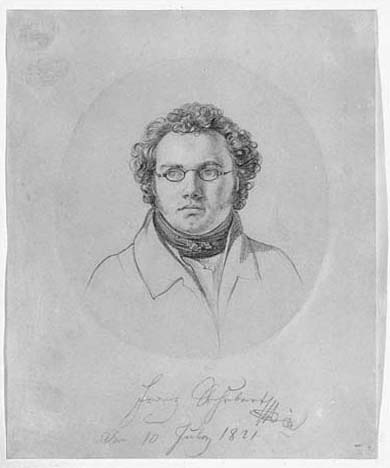2 Schubert and Vienna
2.1 Introduction
If Goethe is regarded as the greatest German poet of his time, Franz Schubert (see Figure 1) is generally accepted as the greatest songwriter of the period. But their careers and experience could not have been more different. Unlike Goethe, who lived into his 80s, Schubert died at the age of 31. Goethe's writing career extended from the 1770s, when Enlightenment writing was at its height, to his death in 1832, by which time Romanticism was in full flood. Schubert's important work was concentrated into a period of 15 years at most. Goethe for many years enjoyed esteem and status beyond that of any literary figure in Europe. Schubert was, until long after his death, virtually unknown except to a circle of friends and connoisseurs in and around Vienna. The dominant musical figure in Vienna during Schubert's lifetime was Beethoven, who died in 1827, just one year before Schubert. Schubert greatly admired Beethoven, but probably never even met him, and was merely one of many young composers struggling to earn a living in his shadow. Many of Schubert's large-scale works – symphonies, piano sonatas, string quartets and other chamber works – remained unplayed and unpublished until half a century after his death. The only field in which he did achieve limited success was as a songwriter. A handful of his songs achieved local fame in Vienna during his lifetime, and some of them were modestly successful when published, selling five or six hundred copies while he was alive. But this hardly amounts to ‘success’ for a composer who has since come to be regarded as one of the major musical figures of the nineteenth century. And the songs published in Schubert's lifetime were only a small fraction of the more than 600 which are now to be found in the complete edition of his works.

Schubert's father was a schoolteacher, and Schubert earned a living as a young adult by working as an assistant teacher in his father's school. From 1818, when he was 21, until his death ten years later, he led a precarious existence as a professional composer, depending for income on friends and patrons, and the small amount he earned from publications of his works.
The Vienna in which Schubert lived in the early nineteenth century was full of domestic music-making. But the centre of musical activity had shifted somewhat since the late eighteenth century. Then it was the aristocracy who had supported Mozart and, at the turn of the century, the young Beethoven. By the time Schubert was active as a composer, the middle classes were taking over as the main musical patrons. This change is summed up by the Schubert scholar, Maurice Brown:
Secular music was no longer the product and solace of the aristocratic patron; the prince and priest of the eighteenth century, whose establishments contained bands of musical servants hired to perform chamber and orchestral music, with a composer-servant at their head to provide that music – they were passing. Instead, the wealthy middle-classes were paying the piper, and they called the tune. The publishing-houses were pouring out the songs and dance-music and pianoforte pieces which they loved and asked for. The piano was the centre of this music-making, and in the large and comfortable houses of the merchants and lawyers and civil servants were held these musical evenings, often weekly, to which numbers of guests were invited, and at which part-songs and cantatas, songs, chamber-music, pianoforte duets and so forth were performed.
(1966, p.11)
It was at such gatherings, though occasionally at more public concerts, that Schubert's songs and small-scale instrumental pieces became known in well-to-do middle-class circles in Vienna. Some of his first contacts with these circles were made when he was still a teenager. In 1816 Schubert was asked by a group of law students to write a cantata for the name-day of their professor. The cantata was called ‘Prometheus’, and was reported to be a fine work, though it was lost after Schubert's death. One of the students who sang in the chorus, and whom Schubert met for the first time on this occasion, was Leopold von Sonnleithner, the son of a distinguished barrister, Ignaz von Sonnleithner. The Sonnleithners were one of those prominent families in Vienna who held weekly concerts in their house to a large audience of invited guests. They became Schubert's friends and supporters, his music was often played and sung at their concerts, and they helped to raise money to publish some of his songs. By the 1820s, several households, including the Sonnleithners, were devoting whole evenings to Schubert's works, and these gatherings came to be known as Schubertiads. The first report of such a gathering was made in January 1821:
Franz [von Schober] invited Schubert in the evening and fourteen of his close acquaintances. So a lot of splendid songs by Schubert were sung and played by himself, which lasted until after 10 o'clock in the evening. After that punch was drunk, offered by one of the party, and as it was very good and plentiful the party, in a happy mood anyhow, became even merrier; so it was 3 o'clock in the morning before we parted.
(Quoted in Deutsch, 1946, p. 162)
